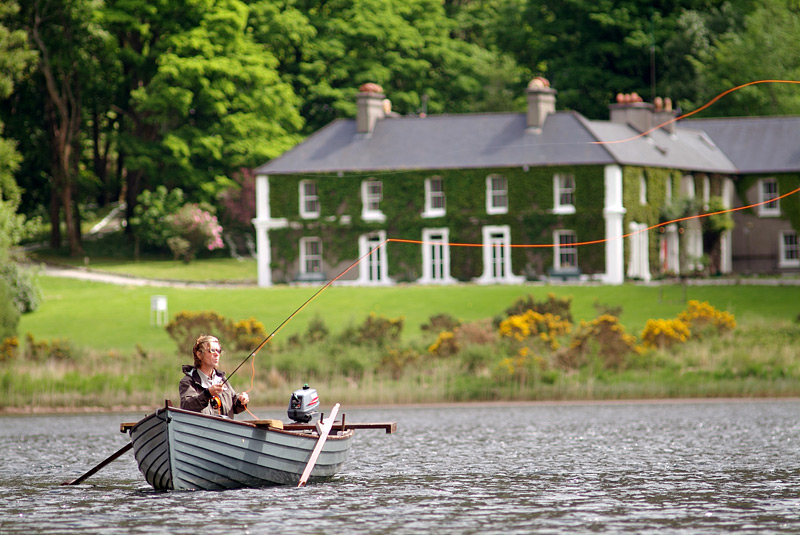There’s a reason I’m writing this at Christmas. I am an advocate for Delphi’s new syndicate, which involves timeshare in their fishing cottages, and I think its membership would make an angler a most welcomed holiday gift; but a nice stay in the estate house herself with a reel and a couple of days is where I drift off to when I close my eyes at night. I imagine being at Delphi at Christmas. What a fine place it would be to sit by the grand fire, or the little library hearth, or at a shared meal alongside its dining table. Foremost, one is a guest at Delphi, but with communal meals and only thirteen rooms, never will a hotel compare to a stay at an Irish country home made open to the public. One curmudgeon even called it too intimate, that’s how inviting is the house. (Besides, he wasn’t there for the fishing.) It is just big enough to give strangers elbow room, to allow for parties beyond private, but no bigger. At one stage, lodging was doubled when an extension that blends beautifully into the original structure was added, but it was done so well you would not know one end of the house from the other.
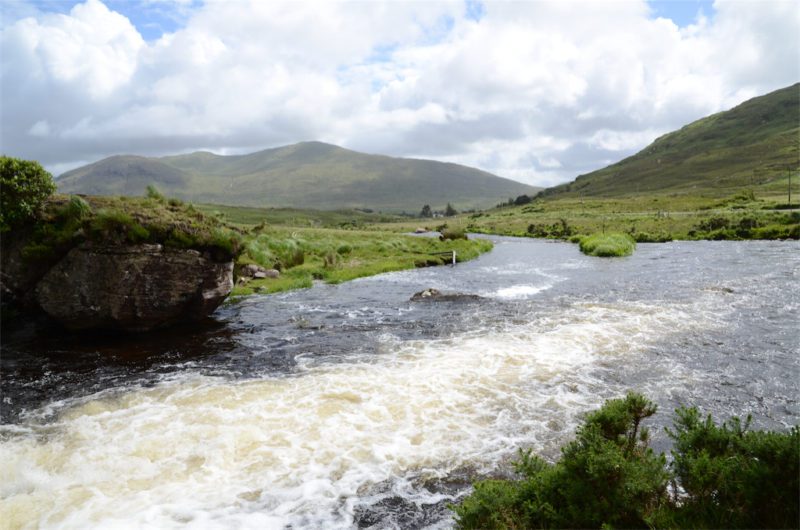
Every December the team at Delphi (pronounced with a long e, as in Del-fee) harvest salmon eggs and sperm and fertilize them not in what I first imagined was a petri dish but is in fact a bucket. They stir them with a feather. Yes, a feather. Later, they watch for the day the paar turn around in their tubs and begin to look for the sea. It is astonishing that something exists so beautifully designed as to change direction on a single day in its life cycle. Humans take years to complete puberty and sexually mature, much less chart a life. In one day, a juvenile salmon decides it is time to swim in the other direction.
Delphi is a braided place too beautiful to define by the men who most often occupy her. There are more men in the fishery there than women, sure, but the place itself is like angler, one of those rare and beautiful terms preloaded with gender neutrality. I was reminded of this when the estate’s oldest ghillie Tom made some crude joke about land in Ireland only falling into the hands of women by accident, and Michael Wade, the estate manager, egged me on by intentionally stumbling over the term fisherwoman. “Seriously?” I asked. “It’s just angler.”
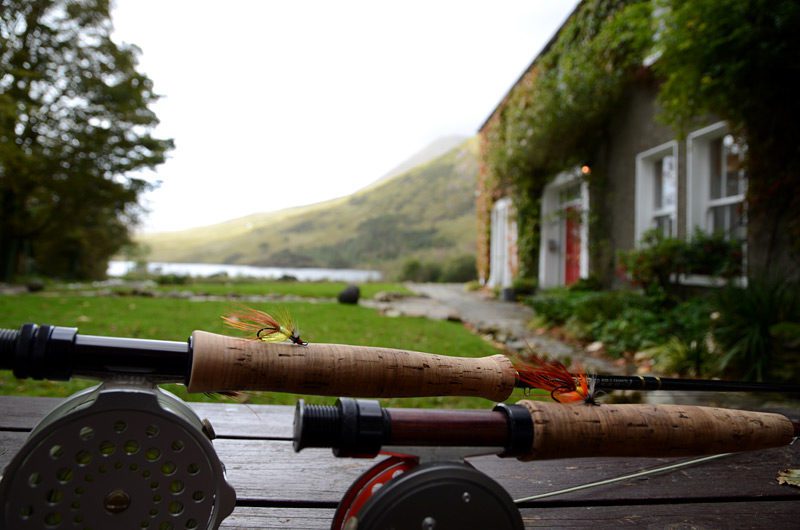
Had I thought of it, I’d have told them the thinking man’s sport as its called translates loosely in my own vernacular to the woman’s sport, and I’d have asked them if they knew it was a woman who wrote the oldest fly fishing essay we know of, back in the fifteenth century, nearly two hundred years before Izaak Walton’s seminal work of The Compleat Angler. (Men love to be seminal, so let them.) The truth is both writings are hard to understand, but it’s just to say there is nothing new about the trend of women in fly fishing. Yes, it is a glorious time for women in the sport. The media has caught on. The market has caught on. The fly fishing market makes in a year what the conventional market makes in a day, but it is responding with more options for women. Unlike hunting, we’ve managed to yield gear offerings outside bright pink, as if it is understood female anglers have taste.
Still, there’s all these things I can’t or won’t do as a woman. I won’t build with stone, but some women do. I won’t play rugby, but some women do. I sail, but I rely heavily on others, often men, to do a lot of the heavy lifting. Boating is a lot of work. I tried explaining that to a public relations client manager from Dublin recently, and she thought I was making an anti-feminist statement. I tried to explain it was a kind of post-feminist statement. She was too clever for me. There’s a reason I say all this, and it is that the men at Delphi Lodge had a lot to teach me, I absolutely love them for it, and I cannot wait to be back. I am already planning a girl’s trip. An angler’s trip.
One of a scattering of salmon hatcheries sending smolts into the world with hair-thin microchips, Delphi is an important player in the attempt to save the king of fish. While a salmon farm south of the fishery threatens their livelihood and wiped out the sea trout population before the team at Delphi carefully nurtured it back to relative health, the they know salmon farms are here to stay. They simply want the farms to use water filtering methods on land or in their current waters that would prevent farmed salmon from contracting sea lice and similar parasites that native species like the sea trout cannot withstand.
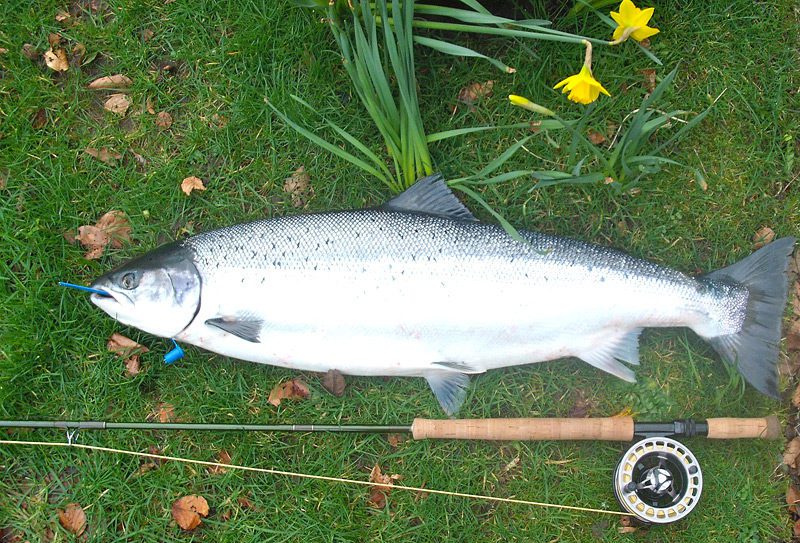
Trawling with Tom, I fished two brown trout. One was so small he hardly can count, but however small the other was as big as he will get before he swims from his home of Doolough (“Dark Lake”) through Finlough (“Bright Lake” or “Fin’s Lake,” nobody knows) and the Bundorragha River to the immediate salt waters where he can find plenty to eat and live his days at sea before coming home.
That same night, I cast into the pools of the Bundorragha River with a Swiss man named Oors who has been fishing Delphi for 27 years. He gently corrected my cast, and when he disappeared down river and the last light of the evening was fading fast and midges impairing my every move, I found myself wanting to unsnag from a fern and get back in the water, or to aim a little better a few yards out to exactly where he’d said, with a kind of fever. There’s an impetus simultaneously desperate and calm to do it right once you have done it at all. My dream was so thick that it would be a day before I realized fishing Delphi with Oors was my first time fly fishing in Ireland. I’d only brought myself there fueled on will, only relaxed in the luxuries of the hot bath, the honesty bar, and the popping fire (being invited to “throw the odd log on” while I was sitting there), and four-course dinners so filling my belly ached, to wake up into world class fishing. Even now you cannot pinch me.
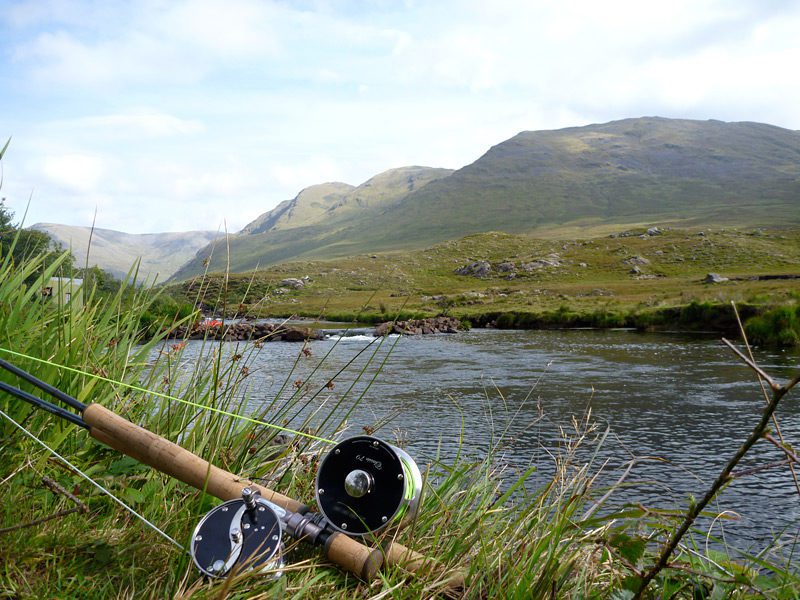
I hiked some 60 miles into and out of Delphi and the local villages. I hiked more than I fished. I meant to spend all summer fishing, but I was not brave enough. I went instead to meet some women from a public relations firm focused on food brands. Preceding Delphi I spent a month of my life editing Tweets at the whimsical demands of a Dubliner with what they call a posh accent and a talent for spin. I am writer and editor, and it still took me three weeks to duplicate the kind of formula she had for hashtags, short links, and tags. These Tweets basically fell into a vacuum. It took me so long to master her craft because I saw how pointless and limited their performance, so what made her style any better than mine, or shouldn’t we try something new to see if it worked? Yet by nightfall of a first day fishing with Oors I’d internalized everything suggested about my casting I think because the results were tangible. Oors has a trophy salmon on the wall at Delphi. The only one bigger was fished by a woman. It is not that fishing matters more than Tweeting. In fact, the latter might shadow the former. Still, hers is considered the real job.
As much as I was charmed by the clever Dubliner when she popped into town, her trivial edits came through instant message like annoying taps on the shoulder reminding me I was in the wrong pond. Meanwhile, Oors spoke to me audibly in English that if not broken was certainly measured, and there was a gentle humor to his mocking when I followed his motion and asked, “Mending the line?”
“Yes,” he said. Mending the line.
We do this in life. We make our cast, and then adjust again and again toward what is finally natural.

